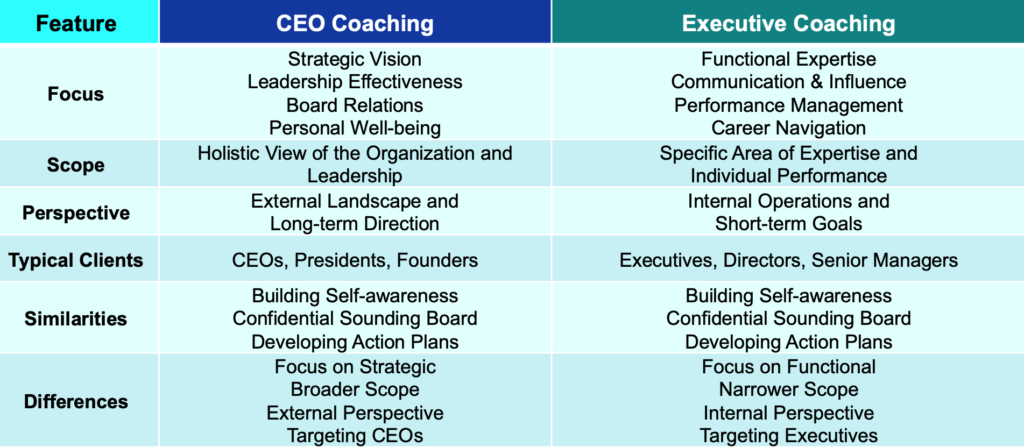
At the helm of any organization sits the CEO, the captain navigating the often-choppy waters of competition, strategy, and leadership. But even the most seasoned skippers need a guiding hand sometimes. This is where Coaching comes in, offering CEOs and other Executives invaluable support in their journeys. However, with terms like “CEO Coaching” and “Executive Coaching” swirling around, it can be confusing to understand the nuances and who needs what. So, let’s dive into the world of Leadership Development and explore the distinct roles of CEO and Executive Coaching.
CEO Coaching: Charting the Strategic Course
Imagine a CEO standing on the bridge of a vast ocean liner. The vast expanse of possibility stretches before them, but so do the looming icebergs of market shifts, talent challenges, and unforeseen disruptions. A CEO Coach acts as their personal navigator, helping them chart a course for long-term success.
Focus:
- Strategic vision and direction: CEOs grapple with setting the overall direction for the company, ensuring alignment with market trends and stakeholder expectations. Coaches help them craft compelling visions,translate them into actionable strategies, and navigate complex decisions.
- Leadership effectiveness: Leading from the front requires a unique blend of skills. Coaches work with CEOs to hone their communication, decision-making, delegation, and motivational abilities, fostering a culture of high performance.
- Board and investor relations: The CEO is the primary interface between the company and its board and investors. Coaches equip them with effective communication strategies to build trust, secure buy-in, and manage expectations.
- Personal well-being: The immense pressure on CEOs can take a toll on their well-being. Coaches provide confidential space for CEOs to address stress, maintain work-life balance, and cultivate resilience.

Executive Coaching: Sharpening the Individual Ax
Now, picture an Executive Officer, a key lieutenant on the bridge, expertly manning a specific station. An Executive Coach acts as their personal trainer, sharpening their skills and optimizing their performance within the broader strategic framework set by the CEO.
Focus:
- Functional expertise: Executive coaches help executives refine their skills within their specific domains, be it finance, marketing, operations, or human resources. This involves honing technical knowledge, leadership within their teams, and driving results in their areas.
- Communication and influence: Effective communication and the ability to influence others are crucial for any executive. Coaches help them develop clear and concise communication styles, build rapport with stakeholders, and navigate complex negotiations.
- Performance management and development: Setting goals, providing feedback, and fostering talent growth are essential for any leader. Coaches equip executives with these skills, enabling them to build high-performing teams and unlock the potential of their people.
- Career navigation: Executives often face crucial career crossroads. Coaches provide guidance on career progression, leadership development opportunities, and navigating internal politics.
The Overlap and the Uniqueness
While distinct in their focus, CEO and Executive Coaching share some common ground. Both involve:
- Building self-awareness: Coaches help both CEOs and Executives understand their strengths, weaknesses, and leadership styles, promoting self-reflection and growth.
- Providing a confidential sounding board: Both roles offer a safe space for leaders to discuss challenges,brainstorm ideas, and receive objective feedback without judgment.
- Developing action plans: Coaches work with individuals to set SMART goals, develop actionable strategies, and hold themselves accountable for progress.
However, the key differentiator lies in the scope and perspective. CEO Coaching takes a holistic view, focusing on the leader’s role in shaping the entire organization’s direction and navigating external landscapes. Executive Coaching adopts a more focused approach, honing individual skills and optimizing performance within the CEO’s established strategic framework.

Choosing the Right Coach: Finding Your Perfect Compass
Whether you’re a CEO charting the course or an Executive fine-tuning your skills, finding the right coach is crucial. Consider these factors:
- Experience and expertise: Look for coaches with proven experience working with leaders at your level and within your industry.
- Coaching style and approach: Some coaches are directive, while others take a more collaborative approach. Choose a style that resonates with you and your learning preferences.
- Chemistry and trust: Building a strong rapport and trust with your coach is essential for open communication and effective coaching.
Both CEO and Executive Coaching can be invaluable tools for navigating the complexities of leadership. By understanding the nuances of each and finding the right coach, you can unlock your full potential and steer your career, and your organization, towards success.